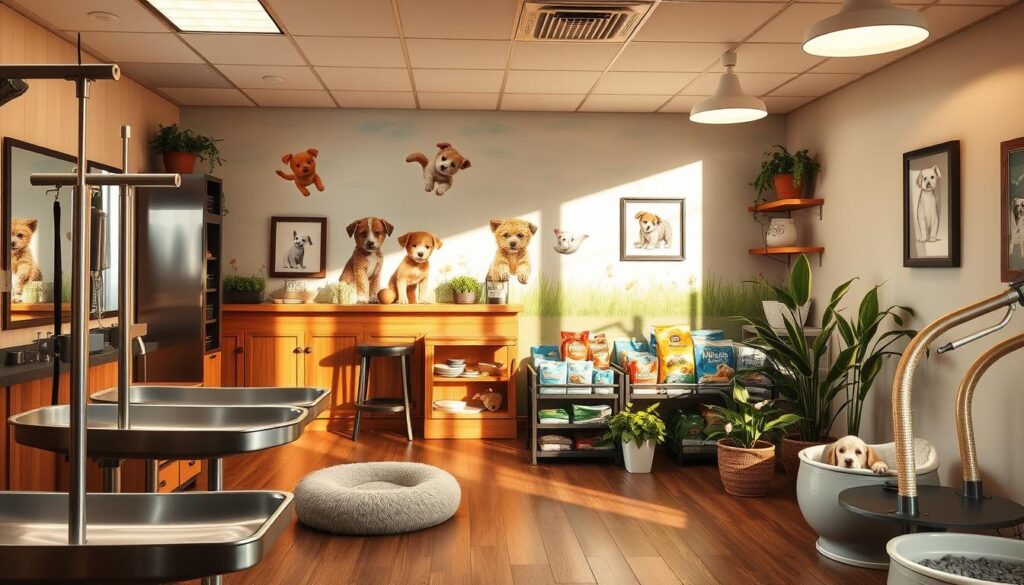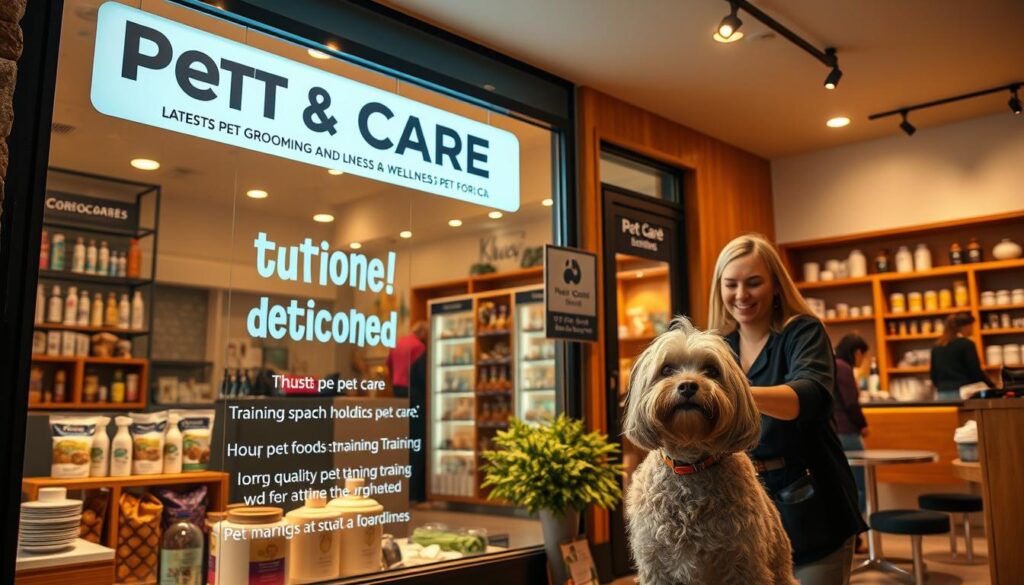Are you wondering how to make your pet care business stand out in a growing market?
As pet ownership continues to rise, the pet care industry is evolving rapidly. To stay ahead, it’s crucial to adapt to changing client needs and market conditions.
I’ve seen firsthand that running a successful pet care business requires a mix of passion, hard work, and strategic planning. By understanding the latest trends and best practices, you can build a loyal client base and achieve long-term success.
Key Takeaways
- Understand the evolving pet care industry landscape
- Develop strategic plans for your business
- Focus on delivering exceptional services
- Stay informed about the latest industry trends
- Build a loyal client base through quality care
Understanding the Pet Care Industry Landscape
The U.S. pet care market is experiencing significant growth, driven by increasing pet ownership and spending. As a result, understanding the industry’s landscape is crucial for developing a successful business strategy.
Current Market Trends in the U.S. Pet Care Sector
The pet care industry is witnessing a shift towards premiumization, with pet owners increasingly seeking high-quality services and products for their pets. This trend is driven by the humanization of pets, where pets are considered part of the family and their needs are prioritized.
Key trends include the growing demand for pet grooming, training, and wellness services. Additionally, there’s a rising interest in eco-friendly and sustainable pet care products and services.
Identifying Profitable Pet Care Business Niches
To stand out in a competitive market, it’s essential to identify profitable niches. This involves understanding the specific needs of pet owners in your area and tailoring your services to meet those needs.
Some profitable niches include specialized pet grooming for specific breeds, pet training services for behavioral issues, and pet wellness programs focusing on nutrition and health.
- Pet grooming services for senior pets
- Pet training for specific behaviors
- Nutritional counseling for pets with dietary restrictions
Analyzing Your Local Competition
Understanding your local competition is vital to positioning your pet care business effectively. This involves researching existing pet care services, their pricing, and customer reviews.
By analyzing your competition, you can identify gaps in the market and opportunities to differentiate your services. This could involve offering unique services or improving on existing ones.
- Research local pet care businesses
- Compare their services and pricing
- Identify areas for differentiation
All About Pet Care Business Fundamentals
The key to a thriving pet care business lies in its foundational elements. As a pet care professional, understanding these basics is crucial for establishing a reputable and trustworthy business.

Essential Services to Offer Your Clients
To cater to the diverse needs of pet owners, it’s vital to offer a range of essential services. These may include dog walking, pet grooming, and overnight pet sitting. By providing a variety of services, you can attract a broader client base and increase your revenue streams.
Required Certifications and Licenses in the United States
Obtaining the necessary certifications and licenses is critical for operating a legitimate pet care business. In the United States, requirements vary by state, so it’s essential to research the specific regulations in your area. Some common certifications include pet first aid and animal behavior management. Ensuring you have the required credentials will help you build trust with your clients.
Insurance Considerations for Pet Care Providers
As a pet care provider, you need to consider insurance options to protect yourself and your business against unforeseen circumstances. Liability insurance is particularly important, as it can help cover costs in case of accidents or injuries to pets in your care. Additionally, business insurance can provide protection against financial losses due to unexpected events.
By focusing on these fundamental aspects, you can establish a solid foundation for your pet care business and set yourself up for long-term success.
Creating a Solid Business Plan
As a pet care entrepreneur, having a robust business plan in place can make all the difference in achieving your goals. A well-crafted business plan serves as a roadmap, guiding your decisions and helping you navigate the complexities of the pet care industry.
A solid business plan is multifaceted, covering various aspects that are crucial for the success of your pet care business. It begins with defining your unique value proposition, which sets your business apart from the competition.
Defining Your Unique Value Proposition
Your unique value proposition (UVP) is what makes your pet care services appealing to potential clients. It’s about understanding your strengths and the specific needs of your target market. To define your UVP, consider what services you offer that others don’t, and how you can provide a more personalized experience for pet owners.
For instance, you might specialize in caring for pets with specific dietary needs or offer additional services like pet photography or grooming. By focusing on what makes your service unique, you can attract a loyal client base.
Setting Realistic Financial Goals
Setting realistic financial goals is another critical component of your business plan. This involves understanding your startup costs, ongoing expenses, and projected income. It’s essential to be conservative in your estimates and to plan for contingencies.
To set achievable financial goals, you’ll need to analyze your market, understand your pricing strategy, and forecast your revenue. This will help you make informed decisions about investments and expenditures, ensuring that your business remains financially healthy.
Establishing Pricing Strategies That Work
Your pricing strategy is a key element of your business plan, as it directly impacts your revenue and profitability. To establish effective pricing, you need to consider your costs, the level of competition, and the perceived value of your services by pet owners.
A well-thought-out pricing strategy can help you attract and retain clients while ensuring that your business is profitable. It’s also important to be flexible and willing to adjust your pricing as needed based on market feedback and financial performance.
Up Your Pet Care Operations
Efficient operations are the cornerstone of a thriving pet care business, enabling you to deliver exceptional care. As you embark on setting up your pet care operations, several key factors come into play.
Choosing Between Home-Based and Commercial Locations
Deciding on the location for your pet care business is a critical decision that affects your operations, costs, and client perception. A home-based business can offer lower overhead costs and a more personal, homely environment for pets. However, it may require converting a portion of your home into a dedicated pet care area, adhering to local zoning regulations, and potentially impacting your personal space.
On the other hand, a commercial location can provide a professional image, more space for operations, and the ability to serve a larger client base. Nonetheless, it comes with higher rental or purchase costs, equipment expenses, and the need to comply with commercial zoning and health regulations.
Consider the following when choosing between a home-based and commercial location:
- Initial and ongoing costs
- Local zoning and regulatory compliance
- Space and capacity for current and future needs
- Client perception and accessibility
Essential Equipment and Supplies
Investing in the right equipment and supplies is vital for providing quality pet care services. This includes everything from basic pet handling equipment to specialized care supplies, depending on the services you offer.
Some essential items to consider include:
- Pet enclosures or kennels
- Grooming equipment
- First aid kits tailored for pets
- Feeding and hydration supplies
By sourcing high-quality equipment and supplies, you can ensure a safe and healthy environment for the pets in your care.
Creating Efficient Scheduling and Management Systems
Effective scheduling and management systems are crucial for the smooth operation of your pet care business. This involves implementing systems for booking, client communication, pet care scheduling, and staff management if applicable.
“Technology can greatly simplify the management of pet care services, from scheduling appointments to tracking client information and pet care instructions.”
Utilizing pet care management software can help streamline these processes, reduce administrative burdens, and enhance the overall client experience.
By focusing on these key operational areas, you can establish a solid foundation for your pet care business, ensuring it’s well-equipped to deliver high-quality services and achieve long-term success.
Building a Strong Client Base
Establishing a loyal client base is the backbone of a successful pet care business. As a pet care professional, my goal is not only to provide top-notch services but also to build lasting relationships with my clients.
To achieve this, I focus on developing effective pet care business marketing strategies that help me reach and engage my target audience. This involves understanding the latest trends in pet care and leveraging them to my advantage.
Effective Pet Care Business Marketing Strategies
In today’s digital age, having a robust online presence is crucial. I ensure that my business is listed on relevant directories and has a user-friendly website that showcases my services.
Some of the marketing strategies I use include:
- Social media marketing to engage with pet owners and share updates about my services
- Email marketing campaigns to keep clients informed about new services and promotions
- Partnering with local pet businesses to cross-promote each other’s services
By implementing these strategies, I can effectively reach out to potential clients and build a strong reputation in the community.
Creating Loyalty Programs That Drive Repeat Business
Loyalty programs are an excellent way to encourage repeat business and foster a loyal client base. I design my loyalty programs to reward my regular clients for their continued trust in my services.
For example, I offer:
| Service | Reward | Frequency |
|---|---|---|
| Pet grooming | 10% off on the 5th visit | Every 5 visits |
| Pet sitting | Free 1-hour consultation on the 3rd booking | Every 3 bookings |
Collecting and Leveraging Client Testimonials
Client testimonials are a powerful tool for building credibility and attracting new clients. I make it a point to collect feedback from my clients and showcase it on my website and social media channels.
To encourage clients to provide testimonials, I:
- Offer incentives such as discounts on future services
- Make it easy for them to leave feedback through online review platforms
- Respond to all feedback, both positive and negative, to show that I value their input
By leveraging client testimonials, I can build trust with potential clients and demonstrate the quality of my services.
Delivering Exceptional Pet Care Services
The key to a thriving pet care business lies in its ability to deliver exceptional services that meet the unique needs of each pet. As a pet care professional, it’s essential to understand that delivering high-quality services is not just about providing basic care, but also about creating a nurturing environment that makes pets feel comfortable and secure.
To achieve this, it’s crucial to establish a set of guidelines that ensure consistency and quality in the services provided. This is where standard operating procedures come into play.
Establishing Standard Operating Procedures
Standard Operating Procedures (SOPs) are detailed, written instructions that outline the steps to be taken in a specific situation. In the context of a pet care business, SOPs can help ensure that all aspects of pet care, from feeding and grooming to administering medication, are carried out consistently and to a high standard.
Developing SOPs involves identifying the key tasks involved in pet care, determining the best way to perform these tasks, and then documenting these processes. This not only helps in maintaining quality but also in training new staff members.
| Task | Procedure | Responsibility |
|---|---|---|
| Feeding | Feed pets according to their dietary needs, ensuring fresh water is always available. | Pet Care Staff |
| Grooming | Brush pets as needed, bathe according to breed and health requirements. | Pet Care Staff |
| Medication Administration | Administer medication as prescribed by the pet owner, documenting each dose given. | Trained Staff |
Handling Different Pet Personalities and Needs
Every pet is unique, with its personality, needs, and quirks. Handling different pet personalities and needs requires a flexible and compassionate approach. It’s essential to observe and understand the behavior and needs of each pet in your care, adjusting your care strategies accordingly.
For instance, some pets may require extra attention or have specific dietary needs. Others may have behavioral issues that need to be addressed gently and patiently. By understanding these differences, you can tailor your services to meet the individual needs of each pet, enhancing their care experience.

Managing Pet Emergencies and Special Situations
Despite the best care, emergencies can arise. Being prepared to handle pet emergencies and special situations is crucial for any pet care business. This involves having a plan in place for potential emergencies, such as natural disasters, medical emergencies, or escapes.
Training staff on emergency procedures and ensuring that they know how to respond in various situations is vital. Additionally, maintaining up-to-date contact information for pet owners and having a clear communication plan can help in managing emergencies effectively.
By focusing on delivering exceptional pet care services, pet care businesses can not only ensure the well-being of the pets in their care but also build a loyal client base and drive business success.
Financial Management for Pet Care Business Success
As a pet care professional, managing your finances wisely is crucial for long-term success. Effective financial management enables you to maintain a healthy cash flow, invest in business growth, and navigate the challenges of the pet care industry with confidence.
Tracking Income and Expenses Effectively
To manage your finances effectively, it’s essential to track your income and expenses accurately. This involves maintaining detailed records of all business transactions, including income from services, expenses for supplies, and costs associated with marketing and staffing. By doing so, you can identify areas where you can cut costs and optimize your pricing strategies to ensure profitability.
Utilizing accounting software can simplify this process, providing you with real-time insights into your business’s financial health. For more detailed guidance on financial management, you can refer to resources such as top financial management tips for small business, which offer valuable strategies applicable to pet care businesses.
Managing Cash Flow During Slow Periods
Managing cash flow is critical, especially during slow periods when business may be slower. To mitigate the impact of seasonal fluctuations, it’s wise to maintain a cash reserve that can cover several months of operational expenses. Additionally, diversifying your services can help stabilize your income throughout the year.
As Robert Kiyosaki, a renowned financial expert, once said,
“Cash flow is king.”
This principle is particularly relevant for pet care businesses, where cash flow management can be the difference between weathering slow periods and facing financial strain.
Tax Considerations for Pet Care Entrepreneurs
Understanding tax implications is another crucial aspect of financial management for pet care entrepreneurs. This includes being aware of deductions available to your business, such as expenses for pet supplies, travel related to pet care services, and home office deductions if you operate from home. Consulting with a tax professional can help you navigate these complexities and minimize your tax liability.
By focusing on these key areas of financial management, you can strengthen your pet care business’s financial foundation, ensuring its success and sustainability in the long term.
Growing Your Pet Care Business Strategically
Expanding your pet care business demands a thoughtful and well-planned strategy. As the pet care industry continues to evolve, it’s crucial to stay ahead of the curve by adopting effective growth strategies.
Hiring and Training Reliable Staff
One of the key factors in growing a successful pet care business is hiring and training reliable staff. This involves recruiting individuals who are not only passionate about animals but also committed to delivering high-quality care.
To ensure your staff is well-equipped, consider implementing comprehensive training programs that cover essential topics such as animal behavior, health, and safety protocols. For more insights on staff training, you can explore resources like ideas to help grow your pet care or pet sitting.
- Develop a thorough onboarding process for new hires.
- Provide ongoing training and professional development opportunities.
- Foster a positive work environment that encourages teamwork and open communication.
Expanding Your Service Offerings
Expanding your service offerings is another effective way to grow your pet care business. This could involve introducing new services such as pet grooming, training, or even pet photography.
| Service | Description | Target Audience |
|---|---|---|
| Pet Grooming | Bathing, trimming, and styling services for pets. | Pet owners seeking premium grooming services. |
| Pet Training | Behavioral training and obedience classes. | Pet owners are looking to improve their pets’ behavior. |
| Pet Photography | Professional photo shoots for pets. | Pet owners want unique, high-quality photos. |
Scaling Operations Without Sacrificing Quality
As your business grows, it’s essential to scale your operations in a way that maintains quality and efficiency. This might involve investing in new technology, such as pet care management software, or optimizing your operational processes.
Key considerations for scaling operations include:
- Implementing efficient scheduling and management systems.
- Investing in technology that streamlines operations.
- Continuously monitoring and improving your services.
Staying Current with Pet Care Business Trends
To remain competitive, it’s vital to stay up-to-date with the latest pet care business trends. This includes being aware of changes in consumer preferences, new technologies, and emerging industry best practices.

By staying informed and adapting to these trends, you can identify new opportunities for growth and ensure your business remains relevant in a rapidly evolving market.
Conclusion
Running a successful pet care business requires a combination of passion, hard work, and strategic planning. By understanding the industry landscape and establishing a solid business foundation, pet care professionals can build a loyal client base and achieve long-term success.
To start a successful pet care business, it’s essential to focus on delivering exceptional services that meet the unique needs of your clients’ pets. By following the pet care business tips outlined in this article, you can create a thriving business that stands out in the industry.
All about pet care business is not just about providing a service; it’s about building a community of pet lovers and delivering top-notch care to their beloved companions. By staying committed to your goals and continually improving your services, you can build a reputation as a trusted and reliable pet care provider.
Starting a successful pet care business takes time, effort, and dedication, but with the right strategies and mindset, you can achieve your goals and enjoy a fulfilling career in this rewarding industry.
FAQ
What are the key factors to consider when starting a pet care business?
When starting a pet care business, it’s essential to consider factors such as understanding the industry landscape, establishing a solid business foundation, and developing a comprehensive business plan. This includes identifying profitable niches, obtaining required certifications and licenses, and creating effective marketing strategies.
How can I differentiate my pet care business from competitors?
To differentiate your pet care business, focus on defining a unique value proposition that sets you apart from others. This can involve offering specialized services, such as pet grooming or training, or providing exceptional customer service. Staying up-to-date with the latest pet care business trends and best practices can also help you stay ahead of the competition.
What are some effective marketing strategies for pet care businesses?
Effective marketing strategies for pet care businesses include leveraging social media, creating loyalty programs, and collecting client testimonials. By building a strong online presence and engaging with your target audience, you can attract and retain clients, driving business growth and success.
How can I manage finances effectively in my pet care business?
To manage finances effectively, track income and expenses, manage cash flow during slow periods, and consider tax implications to minimize liability. By maintaining a healthy financial position, you can invest in business growth and achieve long-term success.
What are some best practices for delivering exceptional pet care services?
Best practices for delivering exceptional pet care services include establishing standard operating procedures, handling different pet personalities and needs, and managing pet emergencies and special situations. By providing a high-quality experience for pets and their owners, you can build trust and loyalty with your clients.
How can I scale my pet care business without sacrificing quality?
To scale your pet care business, consider hiring and training reliable staff, expanding your service offerings, and implementing efficient scheduling and management systems. By adopting a strategic approach to growth, you can maintain quality and efficiency while expanding your operations.
What are some current trends in the pet care industry that I should be aware of?
Current trends in the pet care industry include the growing demand for pet grooming and training services, as well as the trend towards pet humanization. Staying informed about these trends can help you identify opportunities and navigate challenges in the industry.
How can I build a loyal client base for my pet care business?
Building a loyal client base involves developing effective marketing strategies, creating loyalty programs, and collecting and leveraging client testimonials. By focusing on these areas, you can attract and retain clients, driving business growth and success.








